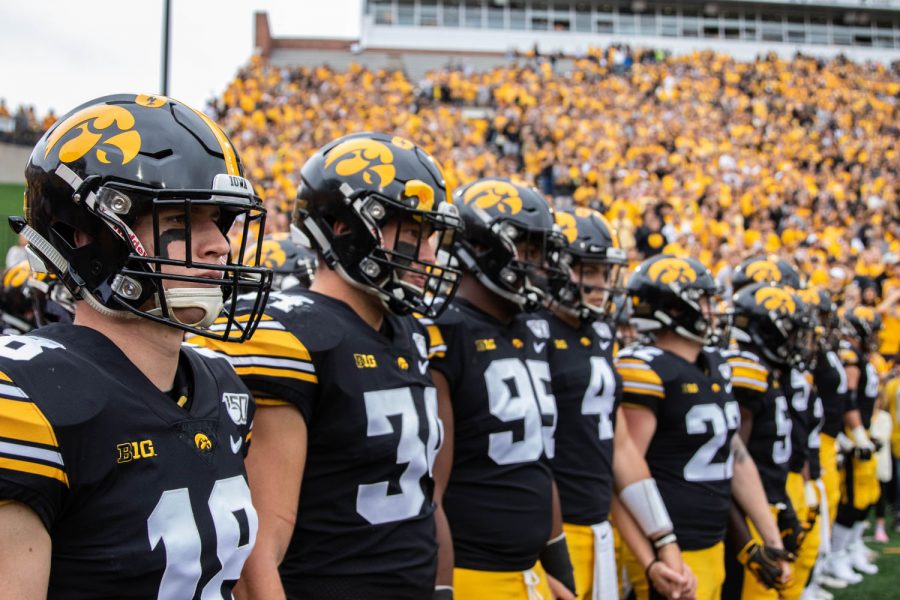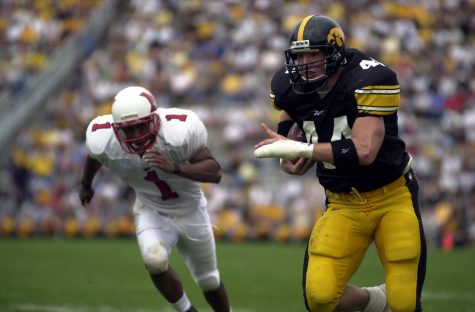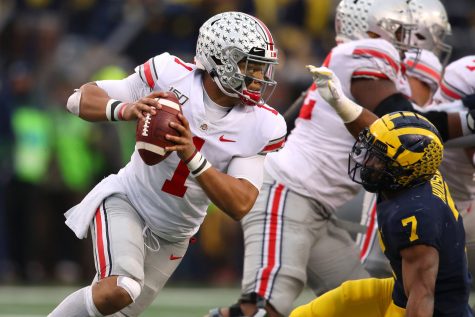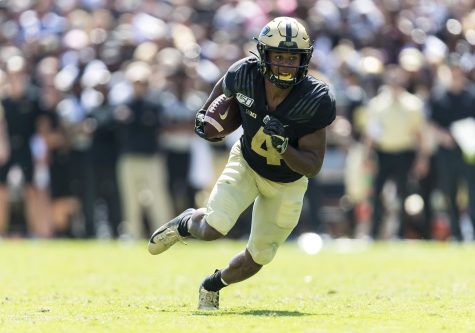Iowa players line up before a football game between Iowa and Middle Tennessee State University on Saturday, September 28, 2019. The Hawkeyes defeated the Blue Raiders 48-3.
From postponed to Purdue: Once-unlikely 2020 Iowa football season kicks off Saturday
After months of uncertainty that a Big Ten football season would even take place, and as the pandemic rages on, the Hawkeyes open their 2020 campaign in West Lafayette.
October 22, 2020
Iowa center Tyler Linderbaum could best compare the offseason to riding a roller coaster for several months in a row.
Wide receiver Tyrone Tracy described trying to keep up with the Big Ten over the summer as a mentally draining experience.
Offensive line coach Tim Polasek’s one-word description for it was “exhausting.”
A schedule was released, then the Big Ten season was called off. Parents protested at conference headquarters, and shortly after all Iowa practices were briefly halted by COVID-19.
And that was just August.
A Big Ten football season like no other was preceded by an offseason like no other. But that’s to be expected when attempting to play college football amid a pandemic.
“The experience was surreal,” head coach Kirk Ferentz said. “… This whole thing has been like a science fiction movie in some ways. I’m not a big fan of science fiction.”
For months, the Iowa football team wasn’t sure if it would have a season in 2020. On Aug. 11, the Hawkeyes thought they had their answer, when the Big Ten postponed all fall sports until the spring because of concerns with the pandemic.
Then a season starting in January was brought up, and shortly after that, playing Thanksgiving weekend was a possibility. Finally, on Sept. 16, the conference reversed its decision. A fall season was happening.
Iowa faces off against Purdue on Saturday in West Lafayette to open its season, despite how unlikely that once seemed.
Back and forth Big Ten
The Hawkeyes knew the offseason was going to be unique in its early stages.
The team finished a morning workout on March 13 before many players left town for spring break. Then COVID-19 shut down all Iowa sports indefinitely. For months, football players were away from the weight room and practice field, instead adjusting to garage gyms and any local high school fields where they could workout.
Because of the pandemic, spring practices were canceled, and Iowa didn’t return to the team facility until June 8 for voluntary workouts. For almost two months, workouts went on despite uncertainty on when the season — originally set to start Sept. 5 with a home game against Northern Iowa — would begin.
After a switch to only playing conference games in 2020, the Big Ten released a new 10-game football schedule on Aug. 5. Six days later, it was thrown out, when the conference’s Council of Presidents and Chancellors voted 11-3 to postpone the season — although the final vote total wasn’t clear until weeks after the decision.
Timeline by Kelsey Harrell/The Daily Iowan
“Initially when the season was canceled, it bothered me a lot,” linebacker Barrington Wade said. “It was going to be my last season. So, me being a fifth-year senior, I was really hurt by it. But I was just maintaining faith that I was going to get another chance to play. I just made sure to stay ready.”
Three of the Power Five conferences moved ahead with their respective football seasons despite the Big Ten and Pac-12, at the time, postponing theirs to the spring.
Many Iowa football players took to Twitter leading up to and following the Big Ten’s postponement announcement, participating in the “We Want to Play” campaign.
Their parents took the lead from there. From sending letters to Big Ten Commissioner Kevin Warren to protesting outside the conference’s headquarters in Rosemont, Illinois, the dozens of parents from around the Big Ten — including many Iowa parents — demanded more information from the conference behind its decision to postpone, and urged it to reverse the decision.
“One day people were talking that [a season] sounds promising,” said safety Jack Koerner, whose father, Gary, was one of the more vocal parents on social media. “One day it sounds like there’s no shot. That’s something that I applaud my dad and my mom for, and the other parents as well, they kept hope. I’d say they even had more hope than I did sometimes. I’d be like, ‘I don’t think there’s a shot.’ And they just kept telling me, ‘We’re making more progress than you think.’”
Much like their sons, social media was a popular outlet for Hawkeye parents to share their thoughts on the conference’s decision.
Maybe a little too popular for Stuart Duncan, father of Iowa kicker Keith Duncan.
“I couldn’t tell you how many times I just told him, ‘Hey, maybe let’s put the Twitter fingers down a little bit,’” Keith Duncan said. “He’s very passionate about football, as well as my career going forward… He’s very passionate. I’m sorry if he was too vocal a little bit. But I’m glad that we have football back.”
Warren reiterated on Aug. 19 that the conference’s decision would not be revisited. But it was. Following weeks of speculation of when the Big Ten could start its season, the conference announced Sept. 16 that its Council of Presidents and Chancellors voted unanimously to play a fall season beginning Oct. 23.
An updated eight-game regular season schedule was released on Sept. 19, and it also included “Champions Week,” a ninth game every team in the conference will play the week of the Big Ten Championship Game.
The Hawkeyes had a little more than a month to prepare for their opening game — which was better than nothing.
“Seeing the other teams playing, it was pretty tough,” wide receiver Ihmir Smith-Marsette said. “Going out there and playing, being able to do the thing they love. That was taken away from us. On the back end, finding out we were able to play was like Christmas. Everybody is happy and excited. Anybody you talk to on the team has a big smile on their face.”
‘We’ve made some pretty big steps’
Accompanying the indecisiveness of the Big Ten, allegations of racism and mistreatment within the Iowa football program emerged, leading to a tumultuous summer for the Hawkeyes.
A tweet from former Iowa offensive lineman James Daniels on June 5, which claimed that there were “racial disparities” within the program and that Black players are treated unfairly, led to dozens of former players speaking out with similar concerns.
Longtime strength and conditioning coach Chris Doyle, accused by several former players of racist and demeaning behavior, reached a separation agreement with the university on June 15 that will pay him $1.1 million.
An investigation into the program’s culture followed.
A review by the law firm Husch Blackwell released on July 30 said the program’s rules perpetuated racial or cultural biases and diminished the value of cultural diversity, and its culture allowed a “small group of coaches” to demean players.
Husch Blackwell’s review recommended that Iowa retain Ferentz, as many players the firm interviewed believed he could lead change within the program. His son, Iowa offensive coordinator Brian Ferentz, was, along with Doyle, at the center of many allegations from former players.
“You have to pay attention, you have to listen,” Kirk Ferentz said. “Going back to Brian, I think he’s done that. I think a lot of guys on our staff, we’ve all given things a look. What we can do better. I think he’s taken advantage of this opportunity, several of us have. Hopefully we will all be better coaches as a result of that.”
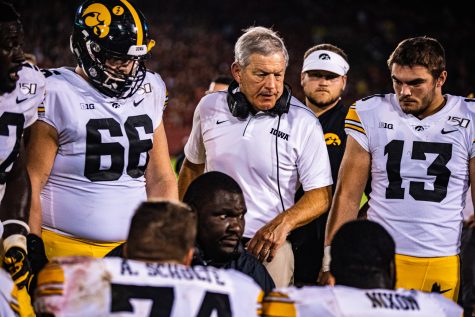
On Oct. 5, an attorney representing eight Black former Iowa football players sent a letter to the UI demanding the removal of Kirk and Brian Ferentz and Athletics Director Gary Barta, as well as a payment of $20 million. The UI declined those requests.
Since the allegations surfaced, current Iowa players have said they feel more comfortable being themselves in the football facility. Cornerback Matt Hankins said that changes have been made to the program in the “best ways possible.”
In June, following the allegations, running back Ivory Kelly-Martin said at times, players had to “walk on eggshells” in the weight room. At Iowa football media day Oct. 6, he said that was no longer the case.
“We have made some pretty big steps,” Kelly-Martin said. “We’re all just trying to come together and figure things out. It’s a process and everything is not going to be perfect in one day. We still have some ways to go.”
Following the events of the offseason, along with the killing of George Floyd by police in May, Tracy said he will kneel during the national anthem on Saturday. All of his teammates will have the option to do the same.
“I know how African Americans are treated in the United States, so me taking a knee is to let everyone know what I stand for and what I believe in,” Tracy said. “I do think there are a lot of different things going on in the world that need some change. I think here in the organization we are going in the right direction. We’ve taken steps to provide change.”
Playing football in a pandemic
The Hawkeyes are playing this fall, but two of the team’s players won’t be.
Ferentz confirmed Oct. 5 that two Hawkeye football players — Djimon Colbert and Taajhir McCall — have opted out of the season because of concerns with playing amid the pandemic.
The Big Ten cited its new access to daily antigen testing when announcing it had reversed its decision to not play.
Every athlete, coach, or other staff member associated with the football team will undergo a rapid COVID-19 test every day —including on gameday — with results coming back that same day. If a player tests positive, they will be away from the team for at least 21 days, while also undergoing cardiac evaluations. Team activities will be shut down for at least a week if the team’s positivity rate exceeds 5 percent. Purdue head coach Jeff Brohm won’t be on the sidelines against Iowa after he tested positive for COVID-19 on Sunday.
On top of the risk involved with playing amid COVID-19, rushing to play a season with only five weeks’ notice was another concern.
The team was rarely together all at the same time over the summer. Pods of players worked out at the team facility in order to limit their exposure to other members of the team. Workouts for all Hawkeye sports were paused for a week starting Aug. 31 following 93 positive COVID-19 tests within the athletic department in one week.
The Hawkeyes practiced 10 times in 12 days following the Aug. 11 announcement, and were in pads on Sept. 30 for the first time since winning the Holiday Bowl.
Ferentz said in May that he would prefer eight weeks to prepare for a season — four weeks focusing on strength and conditioning and four for on-field practices. He’s settling for less.
“I’d be less than honest if I said that I was totally comfortable with starting practice this year,” Ferentz said. “It’s the hardest camp we’ve ever had just because we weren’t sure where our guys were at physically. When the season got pushed, that clearly affected our football team… We really went slow at the start and really tried to be as cautious as we possibly could to try and avoid the injuries that would be avoidable in a normal season.”
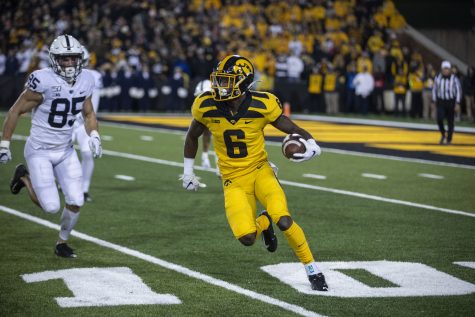
As opposed to a traditional preseason camp that would take place in the blistering heat of the summer, the Hawkeyes are practicing in fall conditions, all while classes are going on.
“I feel like I’m here 24/7, even though I’m away for a couple hours or more,” Tracy said. “It is very difficult and challenging just because you’ve got school on top of all the football and all the lifting and all the rehab that you have to do to get your body prepared for the next day.”
After weeks of playing catch-up while preparing for Week 1, game day is finally near for the Hawkeyes.
Iowa and Purdue kickoff at 2:30 p.m. on Saturday. Instead of the hostile environment the Hawkeyes usually have to compete in on the road in the Big Ten, the stands at Ross-Ade Stadium will be empty — as they will be across the entire conference.
The Hawkeyes thought they weren’t having a season on Aug. 11. But they left the Iowa football facility that day knowing that one was going to happen at some point.
It’s just happening sooner than they may have thought.
“When the time came for us to be back on the field, everybody was excited.” Iowa defensive line coach Kelvin Bell said. “And I was excited as a coach just knowing that the guys I had in the room, they didn’t take that time off. They didn’t take it as a disappointment. They stayed ready. If you stay ready, you don’t have to get ready.”
